Physical Address
Minuwangoda ,Sri Lanka.
Physical Address
Minuwangoda ,Sri Lanka.
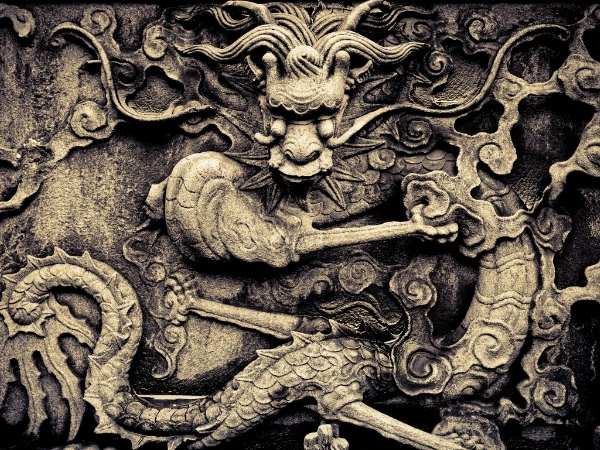
The fascination with dragon tattoos transcends mere body art; it embodies a timeless allure steeped in mystery and symbolism. Across cultures and throughout history, dragons have captivated the human imagination, symbolizing a potent blend of power, wisdom, and mystique. In this article, we embark on a journey to unravel the enigmatic symbolism behind dragon tattoos. From their ancient origins to their contemporary interpretations, we delve deep into the cultural, historical, and personal significance of these mythical creatures inked onto skin. Join us as we explore the intricate tapestry of meanings woven into the fabric of dragon tattoos, offering insights into the human psyche and the enduring appeal of these legendary beasts.
Dragons, mythical creatures of immense power and wisdom, have long been steeped in symbolism across diverse cultures worldwide. Representing a fusion of primal forces and ethereal grace, dragons embody a complex array of meanings that resonate deeply with the human psyche. From ancient mythology to modern folklore, the symbolism of dragons transcends time and place, reflecting universal themes of strength, protection, and transformation.
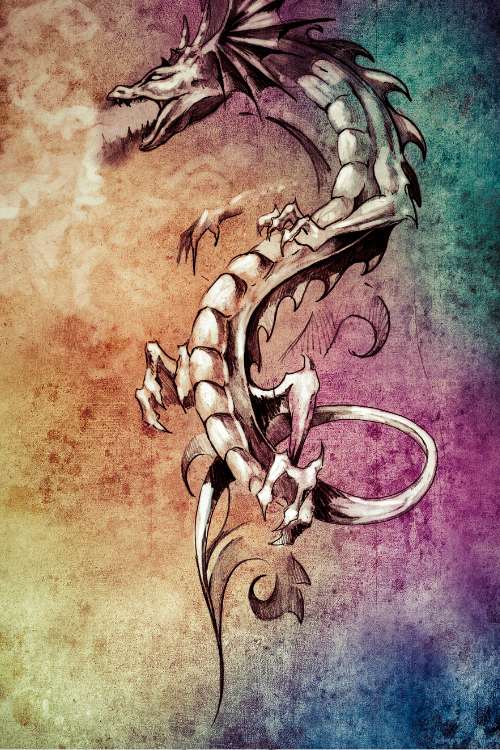
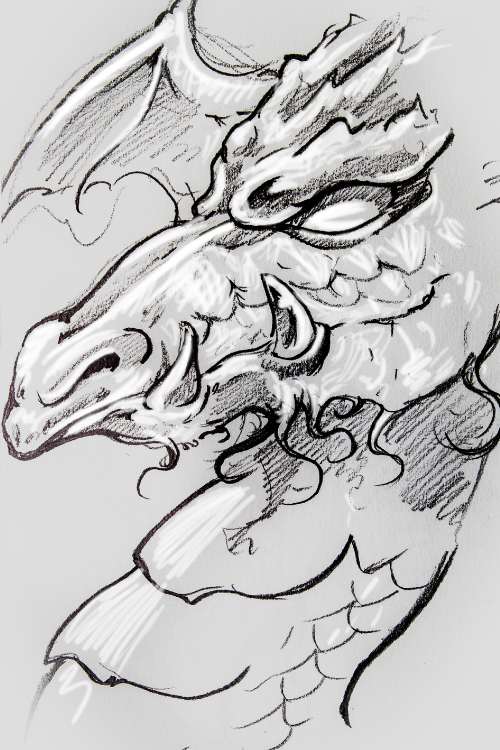

In many cultures, dragons are revered as symbols of strength and power, often associated with rulership and divine authority. In Chinese culture, the dragon is a revered creature, symbolizing imperial power, prosperity, and good fortune. Embodying the elemental forces of water, earth, fire, and air, the Chinese dragon is a potent symbol of cosmic balance and harmony.
Similarly, in European mythology, dragons are often depicted as fearsome beasts guarding hoards of treasure or terrorizing villages. Yet, they also symbolize courage, heroism, and the triumph of good over evil. From the slaying of the dragon by Saint George to the tales of Beowulf, dragons represent the ultimate challenge to be overcome, embodying the trials and triumphs of the human spirit.
In addition to their associations with power and strength, dragons are also symbols of wisdom and enlightenment. In Eastern traditions such as Buddhism and Hinduism, dragons are revered as symbols of enlightenment and spiritual awakening. Often depicted ascending to the heavens or coiled around sacred objects, dragons represent the transcendence of earthly desires and the attainment of higher knowledge.
Moreover, dragons are symbols of protection and guardianship, serving as mythical sentinels against malevolent forces. In many cultures, dragons are believed to possess the power to ward off evil spirits, protect sacred sites, and bring blessings to those they favour. From the dragon gates of Chinese temples to the dragon-shaped prow of Viking longships, dragons are invoked as protectors and guides on life’s journey.
In summary, the symbolism of dragons is as multifaceted as the creatures themselves, embodying themes of power, wisdom, protection, and transformation. Whether feared or revered, dragons captivate the human imagination, offering insights into our deepest fears, aspirations, and desires. In the following sections, we will explore how these rich layers of symbolism are reflected in the art of dragon tattoos, offering wearers a tangible connection to the mythical realm of dragons.
Throughout history, dragon imagery has held profound significance in various cultures around the world, giving rise to the tradition of dragon tattoos as a means of personal and cultural expression. Dating back centuries, dragon tattoos have been emblematic of cultural identity, spiritual beliefs, and social status, leaving an indelible mark on the human experience.
In ancient civilizations such as China and Japan, dragon imagery was imbued with deep cultural and spiritual significance. In Chinese mythology, the dragon is revered as a symbol of imperial power, representing the emperor’s divine mandate to rule. The dragon’s association with water, rain, and fertility made it a potent symbol of prosperity and abundance, often depicted in art, architecture, and ceremonial attire.
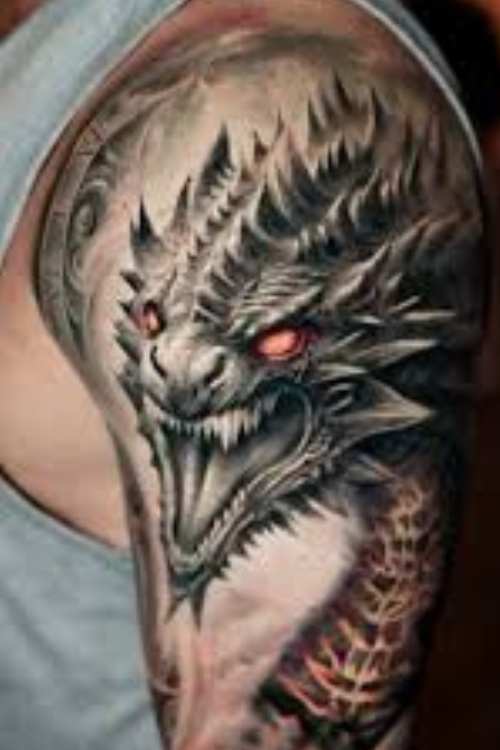
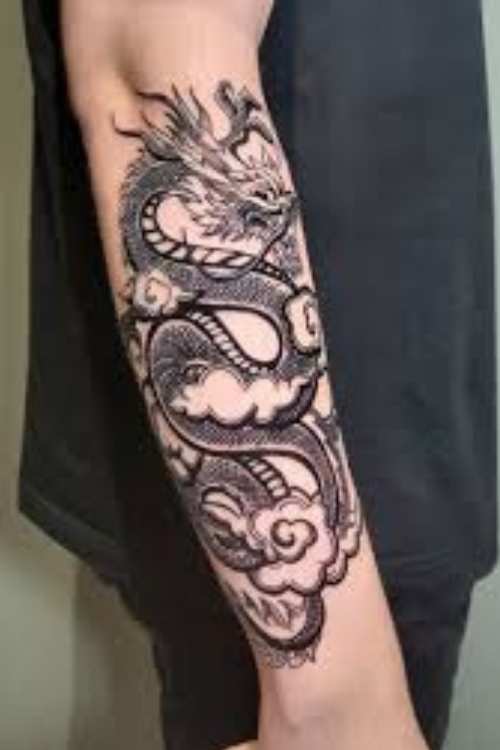
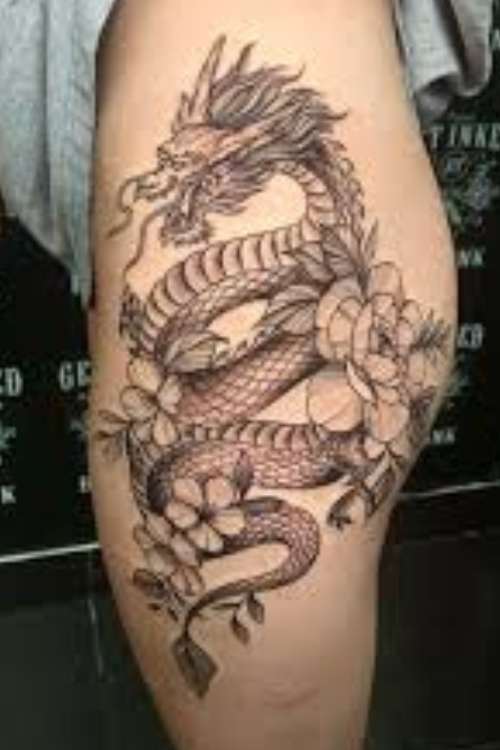
Similarly, in Japanese culture, the dragon holds a prominent place in folklore and legend, symbolizing courage, wisdom, and protection. Known as “ryū” in Japanese, dragons are believed to possess supernatural powers and are revered as guardians of the earth and sky. Dragon tattoos were often worn by samurai warriors as symbols of strength and valour, serving as talismans of protection and good fortune in battle.
In European mythology, dragons were often depicted as fearsome creatures to be slain by heroes and knights in tales of chivalry and adventure. Yet, they also held symbolic significance as guardians of treasure and knowledge, representing the mysteries of the unknown and the untamed forces of nature. Dragon tattoos were popular among Celtic and Norse cultures, where they were believed to offer protection and ward off evil spirits.
In addition to their mythological significance, dragon tattoos have also played a role in social and cultural identity throughout history. In Polynesian cultures, for example, tattooing was a sacred ritual imbued with spiritual meaning, with dragon motifs symbolizing strength, courage, and ancestral connection. Similarly, in indigenous cultures of the Americas, dragon imagery was often incorporated into tribal tattoos to symbolize protection and spiritual guidance.
Overall, the historical significance of dragon tattoos reflects the rich tapestry of human culture and belief, spanning continents and civilizations. From the imperial courts of ancient China to the tribal villages of Polynesia, dragon tattoos have served as enduring symbols of power, wisdom, and spiritual connection, resonating with people across time and space. In the following sections, we will explore how the tradition of dragon tattoos has evolved and how it continues to shape contemporary tattoo culture around the world.
Dragon tattoos hold diverse and multifaceted meanings across different cultures, reflecting the unique beliefs, values, and traditions of each society. From the majestic dragon of East Asian folklore to the fierce serpents of European mythology, the symbolism of dragon tattoos varies widely, offering insight into the cultural significance of these mythical creatures.
In East Asian cultures such as China, Japan, and Korea, dragons are revered as benevolent beings symbolizing power, prosperity, and good fortune. The Chinese dragon, known as “long,” is a celestial creature associated with the emperor and imperial authority. Dragon tattoos in East Asia often depict these serpentine creatures with elongated bodies, adorned with scales, claws, and flaming pearls. They are symbols of strength, wisdom, and protection, believed to bring blessings and ward off evil spirits.
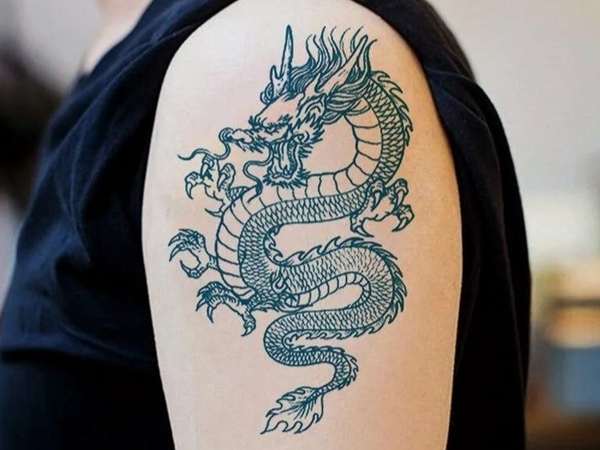
In contrast to the benevolent dragons of East Asia, European dragons are often depicted as fearsome creatures embodying chaos, destruction, and greed. In European mythology, dragons are frequently associated with tales of knights and heroes, who must overcome these formidable beasts to prove their valour. Dragon tattoos in Europe may incorporate elements of heraldry, with dragons depicted as fierce creatures with wings, claws, and fiery breath. Despite their menacing appearance, European dragons also symbolize courage, resilience, and the triumph of good over evil.
In Norse mythology, dragons, known as “drakes” or “worms,” are fierce and powerful creatures associated with the elemental forces of fire and ice. They are often depicted as serpentine beings coiled around trees, mountains, or treasures, representing the untamed forces of nature. Norse dragon tattoos may feature intricate designs inspired by Viking art, with dragons depicted in stylized forms with intricate not-work and swirling patterns. These tattoos symbolize strength, endurance, and the primal forces of creation and destruction.
Beyond East Asia and Europe, dragons appear in the mythologies of cultures around the world, each with its unique interpretations and symbolism. In indigenous cultures of the Americas, dragons are often depicted as guardians of the natural world, with tattoos incorporating motifs inspired by local wildlife and landscape. In African cultures, dragons may symbolize primordial forces or ancestral spirits, serving as protectors and guides in the spiritual realm. The diversity of cultural interpretations highlights the universal appeal of dragons as symbols of power, wisdom, and transformation.
In summary, dragon tattoos are rich in cultural symbolism, reflecting the beliefs, values, and traditions of societies around the world. Whether as symbols of imperial authority in East Asia, heraldic emblems in Europe, or primal forces in Norse mythology, dragon tattoos embody a timeless fascination with these mythical creatures and their enduring significance in human culture.
In the modern era, dragon tattoos continue to captivate and inspire, evolving beyond their traditional cultural meanings to embody contemporary themes of personal expression, individuality, and empowerment. As tattoo culture has become more mainstream and accessible, dragon tattoos have transformed, reflecting the shifting attitudes and values of society.
In contemporary interpretations, dragon tattoos are often seen as symbols of personal strength and resilience. As individuals navigate the challenges of modern life, dragon tattoos serve as reminders of their inner power and ability to overcome obstacles. Whether as a bold statement of defiance or a subtle affirmation of inner strength, dragon tattoos empower individuals to embrace their unique qualities and face adversity with courage and determination.
Moreover, dragon tattoos are increasingly embraced as symbols of transformation and personal growth. In a world marked by constant change and uncertainty, the dragon’s ability to rise from the ashes symbolizes the human capacity for renewal and reinvention. Dragon tattoos serve as reminders of the transformative journey of self-discovery and self-improvement, inspiring individuals to embrace change and embrace the opportunity for growth.
In addition, dragon tattoos are often interpreted as symbols of protection and guidance. Just as dragons are believed to protect treasures and ward off evil spirits in mythology, dragon tattoos offer wearers a sense of security and comfort in an unpredictable world. Whether as guardians of loved ones or protectors of personal values, dragon tattoos serve as talismans of strength and reassurance, guiding individuals through life’s challenges with grace and resilience.
Furthermore, dragon tattoos are celebrated for their aesthetic appeal and artistic versatility. With their intricate scales, sinuous forms, and dynamic poses, dragons lend themselves to a wide range of tattoo styles and designs, from traditional to contemporary. Whether depicted in vibrant colours or intricate black-and-grey shading, dragon tattoos showcase the creativity and skill of tattoo artists, offering wearers a unique and personalized form of self-expression.
In summary, contemporary interpretations of dragon tattoos reflect a fusion of traditional symbolism and modern sensibilities, embodying themes of strength, transformation, protection, and artistic expression. As individuals seek to assert their identities and navigate the complexities of the modern world, dragon tattoos offer a timeless symbol of empowerment and inspiration, reminding us of the enduring power and beauty of these mythical creatures.
In recent years, psychologists have begun to explore the psychological significance of tattoos, including their role in personal identity formation, emotional expression, and self-esteem. Within this framework, dragon tattoos hold particular interest due to their rich symbolism and association with themes of personal growth, transformation, and empowerment.
One psychological perspective on dragon tattoos is their symbolic representation of inner strength and resilience. For individuals facing adversity or undergoing significant life changes, getting a dragon tattoo can serve as a visible reminder of their ability to overcome challenges and emerge stronger than before. The dragon’s mythological traits of power, courage, and endurance resonate with individuals seeking to harness their own inner resources and navigate life’s complexities with confidence and determination.
Moreover, dragon tattoos may serve as symbols of transformation and self-discovery. Just as dragons undergo metamorphosis in mythological narratives, individuals may choose to get dragon tattoos as a reflection of their journey of personal growth and self-realization. By adorning their bodies with images of dragons, individuals can externalize their inner desires for change and evolution, signalling a commitment to embracing new opportunities and overcoming past limitations.
Furthermore, dragon tattoos can function as tools for emotional expression and catharsis. For individuals struggling with trauma, depression, or other mental health challenges, getting a dragon tattoo may provide a sense of empowerment and cathartic release. The act of tattooing can be a transformative experience, allowing individuals to reclaim ownership of their bodies and rewrite their narratives tangibly and visibly. In this sense, dragon tattoos serve as symbols of healing, resilience, and the triumph of the human spirit over adversity.
In addition, dragon tattoos may hold significance within the context of identity formation and self-concept. As individuals navigate the complexities of identity in an increasingly diverse and interconnected world, tattoos can play a central role in shaping and expressing one’s sense of self. Dragon tattoos, with their potent symbolism and association with strength and power, can serve as markers of identity, signalling to others and oneself a sense of agency, individuality, and authenticity.
Overall, from a psychological perspective, dragon tattoos offer a rich canvas for exploring themes of personal growth, transformation, and empowerment. Whether as symbols of inner strength, markers of identity, or tools for emotional expression, dragon tattoos provide individuals with a powerful means of navigating life’s challenges and embracing their unique journeys of self-discovery and self-realization.
Despite their universal appeal, dragon tattoos often carry different meanings and associations based on gender, reflecting societal norms, cultural expectations, and personal beliefs about masculinity and femininity. Understanding the gendered symbolism of dragon tattoos can offer insights into how these mythical creatures are perceived and interpreted within the context of gender identity and expression.
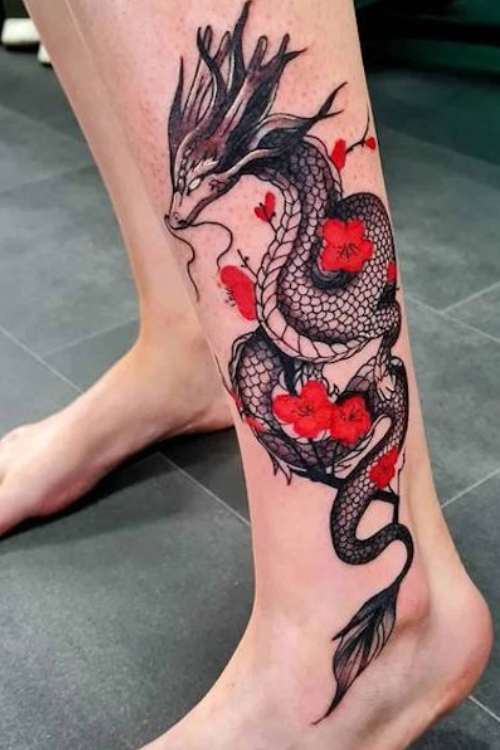
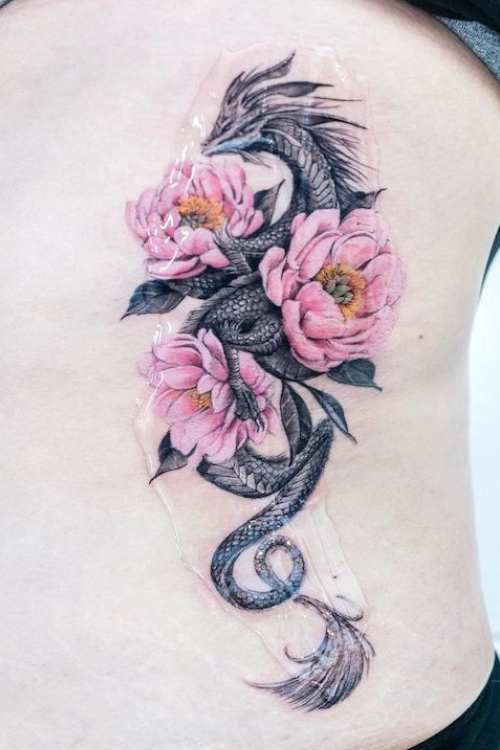
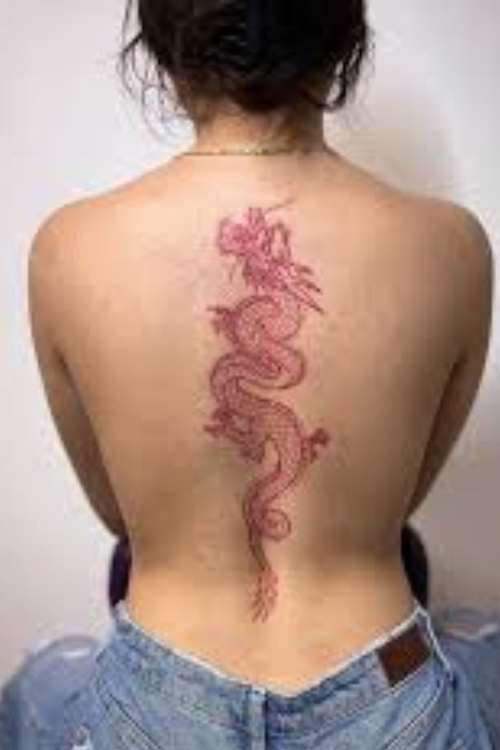
In many cultures, dragons are traditionally associated with masculine qualities such as strength, power, and virility. As such, dragon tattoos have long been popular among men seeking to assert their masculinity and project an image of strength and dominance. For men, dragon tattoos may symbolize courage, resilience, and the ability to overcome adversity, reflecting traditional ideals of masculinity rooted in physical prowess and assertiveness.
Moreover, dragon tattoos for men may serve as symbols of protection and guardianship, reflecting the traditional roles of men as providers and protectors within society. Just as dragons are revered as guardians of treasure and defenders of the realm in mythology, dragon tattoos can signify a man’s commitment to safeguarding his loved ones and upholding his values and beliefs.
Furthermore, dragon tattoos for men may be associated with themes of conquest and adventure, reflecting aspirations for achievement and success. In mythological narratives, dragons are often depicted as formidable foes to be conquered by heroes and warriors, symbolizing the challenges and obstacles that must be overcome on the path to greatness. As such, dragon tattoos can serve as reminders of one’s ambitions and determination to conquer the challenges that lie ahead.
In contrast to the masculine associations of strength and power, dragon tattoos for women may carry different meanings and connotations, reflecting alternative ideals of femininity and empowerment. For women, dragon tattoos may symbolize inner strength, resilience, and the ability to assert oneself in a male-dominated world. By embracing symbols traditionally associated with masculinity, women reclaim agency over their bodies and identities, challenging gender norms and expectations.
Moreover, dragon tattoos for women may be interpreted as symbols of transformation and self-discovery, reflecting a woman’s journey of personal growth and empowerment. Just as dragons are revered as symbols of change and renewal in mythology, dragon tattoos can signify a woman’s resilience and ability to navigate life’s challenges with grace and determination.
Furthermore, dragon tattoos for women may serve as expressions of sensuality and empowerment, celebrating the feminine form and embracing themes of beauty and allure. In tattoo art, dragons are often depicted in elegant and graceful forms, accentuating their beauty and mystique. For women, dragon tattoos can be symbols of self-confidence and self-love, empowering them to embrace their unique qualities and celebrate their femininity.
Overall, while dragon tattoos hold universal appeal, their symbolism may vary based on gender, reflecting cultural ideals and personal beliefs about masculinity and femininity. Whether as symbols of strength and protection for men or expressions of empowerment and self-discovery for women, dragon tattoos offer individuals a powerful means of expressing their identity and asserting their place in the world, transcending traditional gender roles and expectations.
Dragon tattoos offer a vast array of design possibilities, ranging from traditional to contemporary interpretations, each with its own unique symbolism and aesthetic appeal. Whether drawn from mythological lore or inspired by personal creativity, popular dragon tattoo designs reflect a diverse range of cultural influences and artistic styles, captivating the imagination of tattoo enthusiasts around the world.
Traditional dragon tattoos draw inspiration from ancient mythologies and cultural traditions, featuring bold lines, vibrant colours, and dynamic compositions. These classic designs often depict dragons in full regalia, with swirling patterns, intricate scales, and fierce expressions. From Chinese dragons coiled around clouds to European dragons breathing fire, traditional dragon tattoos pay homage to the rich history of tattoo art while embodying themes of power, protection, and mystique.
Realistic dragon tattoos strive to capture the intricate details and textures of the mythical creature, creating lifelike representations that appear to come to life on the skin. These tattoos often feature meticulous shading, highlights, and shadowing techniques to achieve a three-dimensional effect, showcasing the dragon’s scales, claws, and sinuous form in stunning detail. Whether rendered in black-and-grey or vibrant colours, realistic dragon tattoos showcase the skill and artistry of tattoo artists, offering wearers a striking and visually captivating design.
Neo-traditional dragon tattoos combine elements of traditional tattooing with contemporary art styles, resulting in bold and dynamic designs that push the boundaries of conventional tattoo art. These tattoos often feature exaggerated proportions, vibrant colour palettes, and intricate linework, creating visually striking compositions that capture the eye. With their fusion of old and new aesthetics, neo-traditional dragon tattoos offer a fresh take on classic themes of power, protection, and adventure, appealing to those seeking a modern twist on traditional tattoo designs.
In Japanese tattoo culture, dragons hold symbolic significance as guardians of treasures and protectors against misfortune. Irezumi, or traditional Japanese tattoos, often feature dragons as central motifs, depicted in dynamic poses with swirling clouds, crashing waves, and vibrant colours. These tattoos may incorporate traditional Japanese motifs such as cherry blossoms, waves, or dragons, adding layers of meaning and depth to the design. With their rich symbolism and intricate craftsmanship, Japanese dragon tattoos embody the timeless elegance and power of traditional Japanese tattoo art.
Minimalist dragon tattoos take a more understated approach, featuring simple line work and abstract designs that emphasize the essence of the mythical creature. These tattoos may depict a single line tracing the sinuous form of a dragon or a geometric representation of its coiling motion. Despite their simplicity, minimalist dragon tattoos carry powerful symbolism, evoking themes of transformation, renewal, and adaptability in a subtle yet impactful way. With their clean lines and minimalist aesthetic, these tattoos offer a contemporary take on traditional dragon imagery, appealing to those seeking a more subtle and refined design.
Watercolour dragon tattoos showcase the vibrant and expressive qualities of watercolour painting, featuring fluid brushstrokes, translucent washes, and bold splashes of colour. These tattoos often depict dragons in dynamic poses, surrounded by swirling waves, cascading waterfalls, or wisps of mist. With their dreamy and ethereal aesthetic, watercolour dragon tattoos evoke a sense of magic and fantasy, capturing the imagination of those drawn to the whimsical and surreal.
In summary, popular dragon tattoo designs offer a diverse range of options for those seeking to express themselves through body art. Whether drawn to the bold lines of traditional tattooing, the intricate details of realistic designs, or the whimsical charm of watercolour painting, dragon tattoos provide wearers with a powerful means of connecting with the mythical realm of dragons while celebrating their own individuality and creativity.
In the realm of pop culture and media, dragon tattoos have become iconic symbols, representing themes of strength, power, and mystique across various forms of entertainment, literature, and visual arts. From legendary tales of heroism to contemporary portrayals in film, television, and literature, dragon tattoos continue to captivate audiences worldwide, leaving an indelible mark on the collective imagination.
Dragons have long been featured prominently in film and television, captivating audiences with their majestic presence and awe-inspiring abilities. From classic films such as “The Hobbit” and “The Lord of the Rings” trilogy to modern blockbusters like “How to Train Your Dragon” and “Game of Thrones,” dragons have played central roles in epic narratives of adventure, heroism, and conflict. In these cinematic masterpieces, dragon tattoos are often depicted as symbols of power, destiny, and the eternal struggle between good and evil, resonating with audiences of all ages.
In the world of literature and fantasy fiction, dragons have been immortalized in classic tales and beloved series, capturing the imagination of readers with their mythical allure and timeless appeal. From J.R.R. Tolkien’s “The Silmarillion” to J.K. Rowling’s “Harry Potter” series, dragons are recurring motifs in stories of magic, adventure, and heroism, symbolizing the ultimate challenge to be overcome by brave heroes and intrepid adventurers. In these literary works, dragon tattoos are often depicted as marks of destiny, courage, and the indomitable spirit of the human heart, inspiring readers to embrace their inner strength and face life’s challenges with courage and resilience.
In the realm of video games and digital media, dragons are ubiquitous symbols of power and mastery, appearing in countless games, virtual worlds, and online communities. From classic RPGs like “The Elder Scrolls” series to modern multiplayer games like “World of Warcraft” and “Final Fantasy,” dragons are formidable adversaries and coveted allies, embodying themes of conquest, exploration, and adventure. In these virtual realms, dragon tattoos are often featured as customizable options for player characters, allowing gamers to express their individuality and allegiance to these mythical creatures.
In the world of fashion and design, dragon imagery has inspired a myriad of artistic creations, from clothing and accessories to jewellery and home decor. Fashion designers often incorporate dragon motifs into their collections, evoking themes of power, mystery, and sensuality. Whether adorning clothing with intricate dragon prints or crafting statement jewellery pieces inspired by dragon scales and claws, designers celebrate the timeless allure of these mythical creatures, infusing their creations with a sense of magic and wonder.
In the realm of art and illustration, dragons have been a perennial muse for artists and creators, inspiring countless works of art in various mediums and styles. From traditional paintings and sculptures to digital art and graphic novels, dragons are a popular subject of artistic expression, reflecting the diverse interpretations and cultural significance of these mythical creatures. In these artistic endeavours, dragon tattoos are often depicted as bold and dynamic symbols of creativity, imagination, and personal expression, inspiring viewers to embrace their inner fire and unleash their own creative potential.
In summary, dragon tattoos have become iconic symbols in pop culture and media, representing themes of power, destiny, and adventure across various forms of entertainment, literature, and visual arts. Whether portrayed as majestic beasts in epic tales of heroism or celebrated as symbols of creativity and imagination in art and design, dragon tattoos continue to captivate audiences worldwide, leaving an enduring legacy in the annals of human culture and creativity.
As the allure of dragon tattoos continues to captivate the imagination, it’s natural for individuals to have questions about their symbolism, design options, and cultural significance. Below, we address some common inquiries to provide clarity and insight into the world of dragon tattoos:
A1: Dragon tattoos symbolize a wide range of qualities, including strength, power, courage, protection, and wisdom. Across different cultures and mythologies, dragons are revered as mythical creatures embodying both fearsome and benevolent qualities, making dragon tattoos a versatile symbol with diverse meanings.
A2: Popular design options for dragon tattoos include traditional motifs inspired by East Asian, European, and Norse mythology, as well as contemporary interpretations featuring realistic, neo-traditional, minimalist, and watercolour styles. Other design variations may include Japanese dragon tattoos (Irezumi), tribal-inspired designs, and customized creations tailored to individual preferences.
A3: In East Asian cultures such as China, Japan, and Korea, dragons hold deep cultural and spiritual significance, symbolizing imperial power, prosperity, and good fortune. Dragon tattoos in East Asia are often associated with themes of protection, wisdom, and auspiciousness, reflecting the dragon’s revered status as a divine creature.
A4: While dragon tattoos hold universal symbolism, their meanings may vary based on individual interpretations and cultural contexts. For men, dragon tattoos may symbolize strength, power, and protection, while for women, they may represent resilience, empowerment, and self-discovery. Ultimately, the meaning of a dragon tattoo is highly personal and subjective, reflecting the wearer’s unique experiences and beliefs.
A5: When getting a dragon tattoo, it’s essential to be mindful of cultural sensitivities and respectful of the symbolism associated with dragons in different cultures. For example, in East Asian cultures, dragons are revered as symbols of imperial authority and divine protection, so it’s important to approach dragon tattoos with reverence and understanding of their cultural significance.